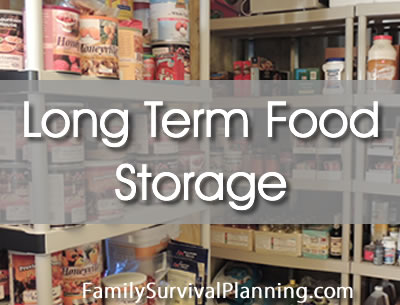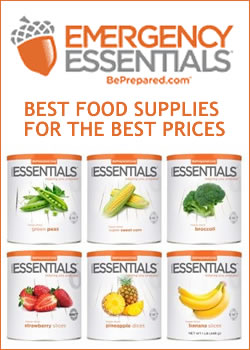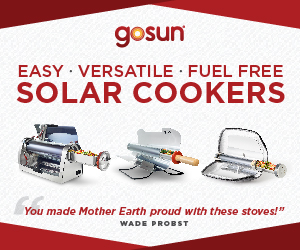
- HOME
- Food Storage Guidelines
- Long Term Food Storage
Long Term Food Storage:
What Foods? How To Store It

In lean times, long term food storage will keep you from starving and hoping someone (government?) will come to your rescue. Don't ever count on it.
In case of an interruption in the supply chain, a failed crop, or financial turmoil, those with long term food storage will survive and even thrive.
Invest in emergency food storage now and enjoy peace of mind for the next 25 years. Don't miss out on the savings!
For long term storage, we need to know what kind of food to store, what kind of containers to buy (for filling or already filled with product), what the shelf life of each kind of food is, and how to inventory and rotate those food products.
What most people likely have stashed away in their basement is a pretty good supply of bare-bones basic foods. These are the kinds of items usually considered for long term food storage.
Basic (Dry) Foods That Store Well Long Term
A supply of bare-bones basic foods is a great place to start your long term food storage program. With a supply of grains, legumes, dry milk, sugar/honey, salt, and a few other supplementary items, you can make these foods edible in simple easy recipes.
Examples of Bare-Bones Basic Foods
- wheat/grains
- pasta
- rice
- legumes/beans
- dry peas
- lentils
- dry milk
- sugar
- honey
- salt
- cooking oil/fats
- yeast
- baking powder
- baking soda
- spices/seasonings
- bouillon/soup base
All of the above foods store very well long term if correctly packaged and stored in a cool, dry area. You may have some favorites that are not on this list — add them to your list.
Use our Food Storage Calculator to determine the amount of each food product you will need for your family for one year. This will help you plan your purchasing.
Long Term Storage Methods
There are other storage methods besides dry canned that can be considered long term storage.
- Canned foods, either store bought or home canned can be stored for several years.
- Freezing foods, if properly stored, can last many years. Frozen foods have a longer shelf life if vacuum packed which eliminates freezer burn.
- Freeze-dried foods generally will last 10-30 years (depending on the food product) and are an excellent way to include variety in your storage.
- Dehydrated foods, either bought in #10 cans already sealed, or dehydrated yourself, will last many, many years if vacuum sealed in canning bottles, in appropriate vacuum sealing bags, or in Mylar bags with oxygen absorbers.
Learning To Use Long Term Foods
Should I rotate my long term food storage?
How to rotate long term food storage to keep food nutritious by using smaller packages and avoiding waste.
When most people consider buying these basic dry foods, some think they will now have to cook from scratch and have boring menus. Well, yes, cooking from scratch may be required, but the menus don't have to be boring.
Believe it not, these basic food products are the foundation for most people's diets, even in those fast-food restaurants. Say you stop in for a burger and a chocolate shake at the nearest burger place. Bare-bones basics are part of that meal: the wheat, oil, and salt in the bun, and milk and sugar used in the shake.
Of course, there is a big difference between the highly processed ingredients from the burger place and the grains and powdered milk in your storage. But the point is, these bare-bones staples have been basic to society since man began growing food.
It would be difficult to exist on just the basic wheat, beans, dry milk, sugar, and salt. For most people, changing from your current diet to a stringent diet of just these 5 basics would likely cause digestive problems.
There are solutions to the digestion problem.
Don't store just wheat; store wheat and barley and oats and more. Don't store just beans; store a variety of beans and rice. A small variety of basic foods is a nutritional improvement over a diet of only one grain.
Next, get used to eating these foods before you are forced to eat them. Make it a point to consistently use the grains, beans and other whole foods in your current meal plans. This will prevent you from becoming ill from the marked change if they suddenly must become your mainstay diet.
These types of foods are good, tasty, healthful, and extremely economical - an important factor in these current times of economical uneasiness.
Where to find the supplies you need for long term food storage:
Buckets - Walmart or Amazon
Wheat, beans, rice, oats (by the bag or bucket) - Augason Farms, Emergency Essentials
What do you think?
I’d love to hear what you have to say in the comments.














